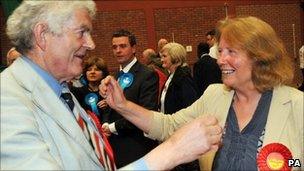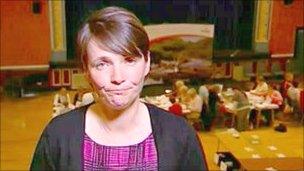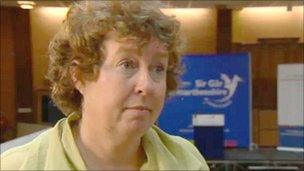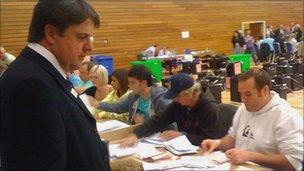Vote 2011: Labour assembly majority is on a knife edge
- Published
Labour's hopes of taking overall control of the Welsh assembly will be decided in north Wales.
With counting under way in the north, the party's ambitions are on a knife edge after a dramatic night of results.
The first north Wales result in Vale of Clwyd took Labour to 26 seats, with 31 needed for an overall majority.
The Tories enjoyed a solid performance apart from leader Nick Bourne losing his regional seat, but there was disappointment for Plaid and Lib Dems.
Labour was tantalisingly short of the numbers it needed by Friday morning, with 12 seats still to declare in north Wales, where counting started at 0900 BST.
Aberconwy and Clwyd West are the two target seats Labour will be looking to win from the Conservatives.

Former First Minister Rhodri Morgan congratulates his wife Julie Morgan after she won Cardiff North for Labour
But it remains tantalisingly short of that number, with most seats still to declare in north Wales, where counting began at 0900 BST.
Conservative sources were already saying Aberconwy, which with Clwyd West is one of Labour's two target seats, was "very close" and difficult to call.
Former Welsh Secretary and Neath MP Peter Hain said whether or not Labour win a majority, they are in a "very strong position to govern in Wales".
"Voters are responding to the leadership of Carwyn Jones and our pledge to stand up for Wales," he added. "And what we're seeing from the results announced so far is people coming home to Labour in Wales, and that's very good news for us."
Overnight results brought relief for Plaid as Rural Affairs Minister Elin Jones held Ceredigion. That came on the back of a painful defeat for deputy leader Helen Mary Jones who lost her seat in Llanelli.
But Ms Jones, who is now out of the assembly for the first time since it was founded in 1999, said: "We have been in this place before in this hall, and had come back. We will again."
In mid Wales, Tory Russell George took Montgomeryshire from the Lib Dems.
The seat was won in 2007 by then Lib Dem candidate Mick Bates, who was expelled by the party after being convicted for drunkenly attacking a paramedic.
But Welsh Lib Dem leader Kirsty Williams, who held Brecon and Radnorshire, said: "It's been a tough campaign for the Welsh Liberal Democrats. We've seen some disappointing results tonight.

Welsh Lib Dem leader Kirsty Williams said the party was constantly asked about the UK coalition
She added: "There's been a big challenge for us with our colleagues in Westminster in power for the first time. We're constantly being asked about the effects of the coalition impacting on our politics here."
But Tories are hopeful that they could become the second biggest party but have had to deal with the blow of Welsh party leader Nick Bourne losing his seat.
Welsh Secretary Cheryl Gillan paid tribute the role he played in "transforming the image and fortunes of the Welsh Conservative Party".
"His leadership, vision and courage have been central to the party's unprecedented levels of success in recent years.
"This result is a great loss to the National Assembly and to me personally."

Plaid Cymru deputy leader Helen Mary Jones leaves the assembly after losing Llanelli
Meanwhile the Greens and UKIP predict they may win their first seats, and both Plaid Cymru and Liberal Democrats fear they will suffer losses.
The party had been aiming to exceed the 12 seats they won in 2007.
In the last assembly, Labour held 26 seats, Plaid 14, Tories 13, Lib Dems six, and one independent.
Plaid, however, has shed votes and seats. Party sources admitted it was a difficult campaign on the doorstep and they had not been expecting any gains.
Former Plaid Cymru MP and lead candidate on the Mid and West Wales list, Simon Thomas, summed up the night when he tweeted: "Bad night for Plaid Cymru; our highwater mark was winning the referendum, time now to learn and rebuild. We can lead, but not yet, not yet."
Ron Davies, former Labour Welsh Secretary who was in Tony Blair's first cabinet, failed to make a comeback as Plaid Caerphilly candidate.
Before his result was declared, Mr Davies said people wanted to send a message to Tories in Westminster through Labour votes.
"It's very sad, it undermines the whole point of devolution," he said.
UKIP, which returned its first Welsh MEP at the last European election, said it was confident it would break new ground by taking one of the four regional seats in South Wales East.

Nick Griffin, leader of the British National Party, at the count in Swansea
Green Party officials said they were "quietly confident" of their first AM, and are targeting 7% of the vote in the South Wales Central region, to elect their Welsh leader Jake Griffiths.
Meanwhile, BNP officials in Swansea East said they had a "fabulous response" to campaigning, and were "optimistic".
Counting of votes cast in north Wales will not begin until later.
As well as assembly seats, people have also voted on whether to replace the first-past-the-post system for electing Westminster MPs with the alternative vote (AV). Counting will start in the AV referendum at 1600 BST on Friday.
There are indications that turnout may be lower than some had expected - around 41% - but final figures will not be known until later on Friday.